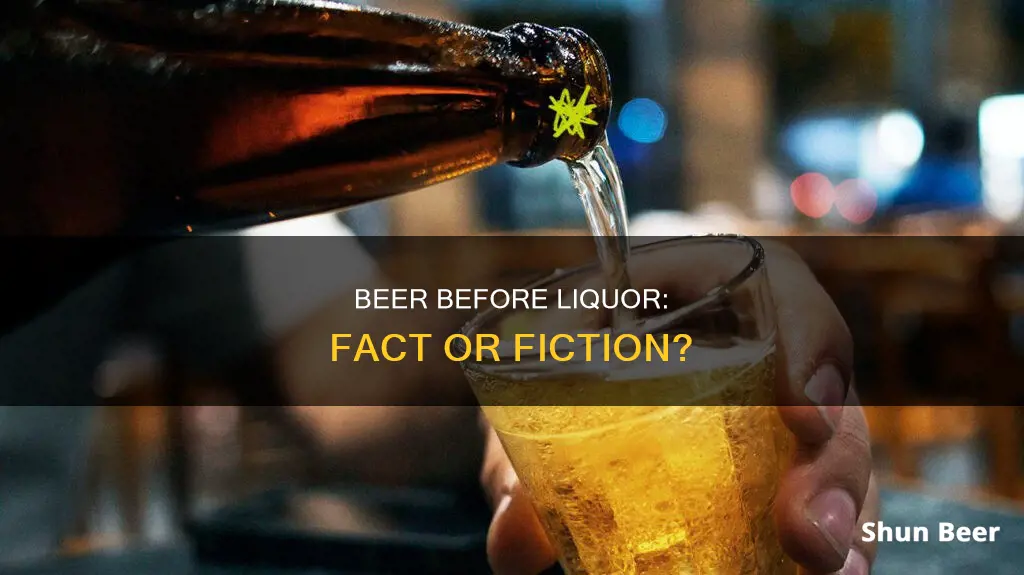
The saying goes, beer before liquor, never been sicker; liquor before beer, you're in the clear. Many people swear by this rule, but is there any truth to it? The short answer is no. It's not the type of alcohol you drink that will make you sick, but how much you drink. However, there are a few factors to consider when it comes to alcohol consumption and its effects. Firstly, the absolute volume of alcohol consumed matters. Different drinks have varying alcohol by volume (ABV) percentages and are consumed in different amounts, so comparing them solely on ABV isn't fair. Secondly, the rate of consumption also plays a role. A beer tends to be consumed slower and over a longer period than a cocktail or a shot due to its larger volume. Finally, how well your body absorbs alcohol in different forms can impact your level of intoxication. While the order of consumption may not significantly affect hangover severity, other factors like total alcohol intake, drinking on an empty stomach, smoking, genetics, and congeners can influence hangover risk.
| Characteristics | Values |
|---|---|
| Common sayings | "Beer before liquor, never been sicker." "Liquor before beer, you're in the clear." "Beer before wine and you'll feel fine; wine before beer and you'll feel queer." "Grape or grain, but never the twain." |
| Truth | There is little scientific evidence to support the idea that drinking beer before liquor will make you sick. |
| Reasons for the myth | Carbonated drinks like beer can irritate the stomach lining, increasing the rate of alcohol absorption. People tend to drink less beer after liquor. People tend to blame the last drink they had for getting sick. |
| Factors that affect hangovers | Amount of alcohol consumed, whether food was consumed with alcohol, genetics, smoking, etc. |
What You'll Learn
- The amount of alcohol consumed matters more than the order
- Carbonated drinks irritate the stomach lining, increasing alcohol absorption
- Liquor first may work because people tend to drink less beer after
- Beer takes longer to drink, so drinking it first may slow your overall consumption
- Drinking water and eating food while drinking alcohol can help prevent hangovers

The amount of alcohol consumed matters more than the order
There is a popular saying that goes, "Beer before liquor, never been sicker; liquor before beer, you're in the clear." This saying suggests that the order in which you consume alcoholic beverages matters when it comes to avoiding a hangover or getting sick. However, the truth is that the amount of alcohol consumed matters much more than the order in which it is consumed.
The idea that drinking beer before liquor will make you sicker is a myth. While it is true that carbonated drinks like beer can irritate the stomach lining, increasing the rate of alcohol absorption, the order of consumption does not change the fact that alcohol is being consumed. Whether you drink beer before liquor or liquor before beer, the total amount of alcohol consumed remains the same, and that is what will determine the likelihood and severity of a hangover.
The belief that beer before liquor makes you sicker may have originated from the observation that people tend to start their evenings with drinks that have a lower alcohol content, such as beer, and progress to liquor as the night goes on. So, if they get sick at the end of the night or feel terrible the next morning, they may mistakenly attribute it to the order in which they drank rather than the total amount consumed.
Additionally, drinking liquor first can lead to faster intoxication, which may cause people to drink more overall. However, this is not always the case, and individual tolerance and drinking pace play a role. Furthermore, a 2019 study found that neither the type nor the order of alcoholic beverages significantly affected hangover intensity.
In conclusion, while there may be some subjective experiences to support the saying, the amount of alcohol consumed is a much more critical factor in determining the likelihood and severity of a hangover. To reduce the chances of a hangover, it is advisable to drink in moderation, stay hydrated, and consume food, especially high-protein and high-fat foods, while drinking.
Brahmins and Beer: Is Alcohol Consumption Allowed?
You may want to see also

Carbonated drinks irritate the stomach lining, increasing alcohol absorption
The popular saying, "beer before liquor, never been sicker; liquor before beer, you're in the clear," is a well-known adage that suggests a particular drinking order can influence the severity of a hangover. However, the order in which alcoholic beverages are consumed has little impact on whether one experiences a hangover. The total amount of alcohol consumed, regardless of the order, is the primary factor influencing hangover intensity.
That being said, carbonated drinks, such as beer, can irritate the stomach lining and affect alcohol absorption. Carbonated beverages introduce air into the stomach, similar to swallowing a big gulp of air, which can cause stomach pain, bloating, and gas. This is known as increased gastric volume, which can lead to feelings of fullness and nausea. Furthermore, the carbonation itself may be registered as pain by the body's pain receptors.
Additionally, carbonated drinks can contain irritating additives such as caffeine and sugar, which can aggravate digestive conditions like irritable bowel syndrome (IBS) and gastroesophageal reflux disease (GERD). These additives can also contribute to negative health effects such as obesity and related health risks.
While the carbonation in drinks like beer may irritate the stomach lining, it is important to note that the overall amount of alcohol consumed is a more significant factor in determining the severity of a hangover.
Beer and Benzonatate: Is It Safe to Mix?
You may want to see also

Liquor first may work because people tend to drink less beer after
There is a popular saying that goes, "Beer before liquor, never been sicker; liquor before beer, you're in the clear." This saying suggests that drinking beer before liquor will make you ill, but if you drink liquor before beer, you'll be fine. However, experts say there is little truth to this claim.
Starting with liquor may help you feel more intoxicated earlier, leading you to drink less overall. However, this is dependent on personal behaviour and has nothing to do with the order in which you consume beer and liquor.
The amount of alcohol consumed and the rate of consumption are more important factors than the type of drink. Drinking beer first may cause you to drink at a slower pace, which could help you pace yourself and avoid drinking too much too quickly.
It's important to note that the order of drinks is unlikely to influence whether you experience a hangover. Alcohol begins to be absorbed into the bloodstream as soon as it reaches the stomach, so all the alcohol consumed will have been absorbed before a hangover takes effect.
The best way to avoid getting sick from drinking is to drink in moderation and avoid binge drinking.
Beer and Health: A Daily Drink, Good or Bad?
You may want to see also

Beer takes longer to drink, so drinking it first may slow your overall consumption
There are many theories about the origin of the saying, "Beer before liquor, never been sicker; liquor before beer, you're in the clear." One common theory is that most people start their nights out with drinks that have a lower alcohol content, such as beer, and then move on to liquor as the night goes on. If they get sick at the end of the night or feel terrible the next morning, they may blame it on the order in which they drank their beverages.
Another factor to consider is the absolute volume of alcohol consumed. A Manhattan cocktail, for example, contains roughly 28% ABV, while a straight whiskey has an ABV of 40%. However, it's not fair to compare these drinks solely based on their ABV since the amounts consumed tend to be different. A bottle of beer will take longer to drink than a cocktail or a shot, simply because it's much larger. Therefore, drinking beer first may help to slow down your overall consumption of alcohol.
According to Dr. Keri Peterson, "With any alcohol, your inhibition decreases, which often leads to drinking more — so if you start with a beverage that has a higher alcohol content, your inhibition goes down more quickly, and you tend to drink more." Starting with lower-calorie options, such as a 5-6% ABV beer, can help monitor the amount of alcohol and sugar entering your system.
However, it's important to note that the order in which you consume your drinks is unlikely to have a significant impact on whether you experience a hangover. As long as the total amount of alcohol consumed remains the same, there is no strong evidence that drinking liquor before beer will protect against a hangover any more than drinking beer before liquor.
The best way to avoid a hangover is to drink in moderation, stay hydrated by drinking water, and consume food, especially high-protein and high-fat foods, while drinking.
Drinking Beer While Driving in Denmark: What's the Law?
You may want to see also

Drinking water and eating food while drinking alcohol can help prevent hangovers
The order in which alcoholic drinks are consumed does not influence the severity of a hangover. The amount of alcohol consumed has a more significant effect on the likelihood and intensity of a hangover than the type of alcohol. Therefore, to reduce the risk of a hangover, it is important to drink in moderation, regardless of the type of beverage.
That being said, drinking water and eating food while drinking alcohol can help prevent hangovers. Alcohol is a diuretic, which means it increases urination and can lead to dehydration, contributing to symptoms like thirst, fatigue, and headaches. Drinking water can help maintain hydration levels and reduce these symptoms.
Additionally, drinking alcohol can lower blood sugar levels, leading to fatigue and headaches. Eating a meal before drinking can slow down alcohol absorption into the bloodstream, reduce blood alcohol concentration, and prevent a drop in blood sugar levels.
While drinking water and eating food can help, the best way to prevent a hangover is to drink in moderation or avoid alcohol altogether.
Beer and Bypass Surgery: What You Need to Know
You may want to see also
Frequently asked questions
No, it is not true. It is not the order in which you drink beer and liquor that will make you sick, but rather the amount you drink.
There are a few reasons why this saying might have come about. One is that carbonated drinks like beer can irritate the stomach lining, increasing the rate of alcohol absorption. Another is that people tend to start their nights out with drinks that have a lower alcohol content, like beer, and move on to liquor as the night goes on. So, if they get sick at the end of the night or feel terrible the next morning, they blame it on the last thing they drank.
No, there is little scientific evidence to suggest that drinking types of alcohol in a specific order can decrease your chances of getting a hangover or make one more bearable.
The best way to avoid a hangover is to not drink on an empty stomach, drink plenty of water, and limit how much and how often you drink alcohol.







